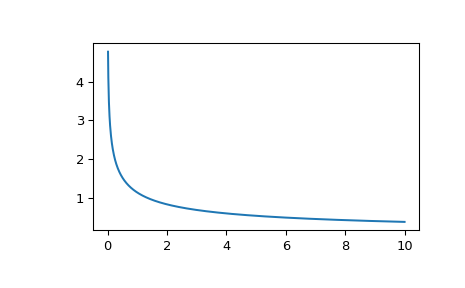scipy.special.k0e#
- scipy.special.k0e(x, out=None) = <ufunc 'k0e'>#
Exponentially scaled modified Bessel function K of order 0
Defined as:
k0e(x) = exp(x) * k0(x).
- Parameters:
- xarray_like
Argument (float)
- outndarray, optional
Optional output array for the function values
- Returns:
- Kscalar or ndarray
Value of the exponentially scaled modified Bessel function K of order 0 at x.
See also
Notes
The range is partitioned into the two intervals [0, 2] and (2, infinity). Chebyshev polynomial expansions are employed in each interval.
This function is a wrapper for the Cephes [1] routine
k0e.References
[1]Cephes Mathematical Functions Library, http://www.netlib.org/cephes/
Examples
Calculate the function at one point:
>>> from scipy.special import k0e >>> k0e(1.) 1.1444630798068947
Calculate the function at several points:
>>> import numpy as np >>> k0e(np.array([0.5, 2., 3.])) array([1.52410939, 0.84156822, 0.6977616 ])
Plot the function from 0 to 10.
>>> import matplotlib.pyplot as plt >>> fig, ax = plt.subplots() >>> x = np.linspace(0., 10., 1000) >>> y = k0e(x) >>> ax.plot(x, y) >>> plt.show()

Exponentially scaled Bessel functions are useful for large arguments for which the unscaled Bessel functions are not precise enough.
>>> from scipy.special import k0 >>> k0(1000.) 0.
While
k0returns zero,k0estill returns a finite number:>>> k0e(1000.) 0.03962832160075422